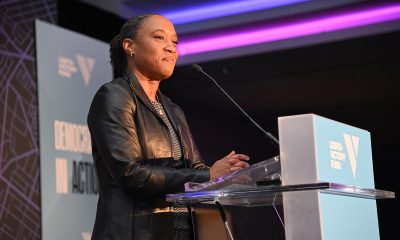homepage news
Capital Pride critics dominate tense meeting
Board promises ‘reassessment’ of corporate sponsors in 2018
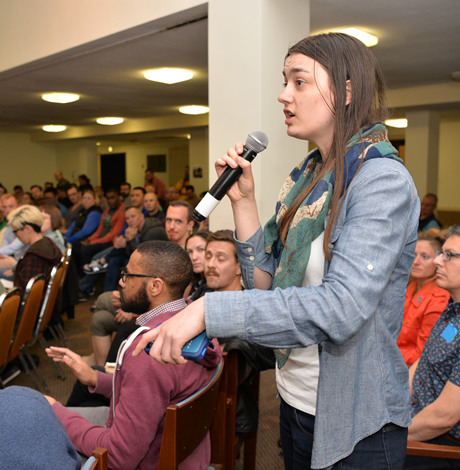
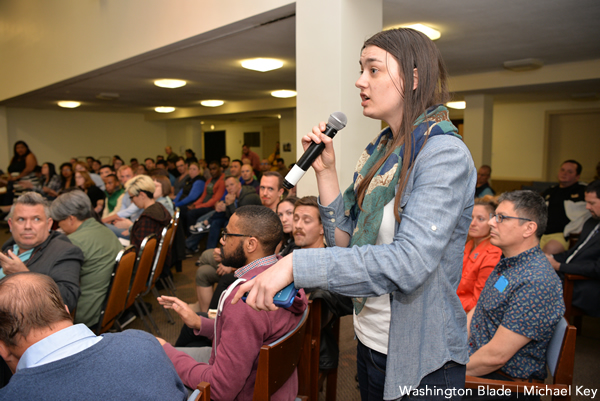
A Capital Pride board of directors meeting Monday night drew nearly 200 people, many of whom were critical of the organization. (Washington Blade photo by Michael Key)
Nearly all of more than 40 audience members who spoke at a Capital Pride Board of Directors meeting Monday night expressed support for a dissident group’s demands that corporations and D.C. police be banned from participating in the Capital Pride parade and festival set for June 10-11.
The meeting, which took place in a basement meeting hall at National City Christian Church on Thomas Circle, drew close to 200 people.
It also took place a little over a week after members of No Justice No Pride, who describe themselves as a coalition of local LGBT activists dissatisfied over the way Capital Pride has been run, called on their supporters to “pack” the May 8 board meeting to push for radical changes in this year’s Pride events.
The audience appeared evenly divided in its support or opposition to Capital Pride’s current plans for Pride in the way it cheered and applauded speakers voicing differing opinions.
But the large majority of those who spoke, other than Capital Pride board members, voiced strong criticism of what they said was Capital Pride’s reluctance to change its events from a celebration to a protest to reflect the political changes brought about by last year’s presidential election.
“Why are you having weapons manufacturers as sponsors?” said one audience member, who was among those demanding that Capital Pride immediately eliminate corporate sponsors, especially those that are part of what he said was the “military-industrial complex.”
The audience member may have been referring to U.S. defense contractors Northrop Grumman and Lockheed Martin that are among the Capital Pride corporate sponsors this year.
A woman who said she was a Native American said another of Capital Pride’s corporate sponsors, Wells Fargo Bank, was financing the Dakota Access Pipeline, which she said threatened to destroy sacred lands where Native Americans were “victims of genocide.”
Capital Pride President Bernie Delia; the group’s executive director, Ryan Bos; and board members Rachel Gleischman and Vernon Wall, who served as moderators for the discussion, each said Capital Pride had yet to develop criteria and a policy for determining who the corporate sponsors should be.
Delia said the board would conduct a reassessment of how corporate sponsors are approved but said there wouldn’t be enough time to do this for the 2017 Pride events.
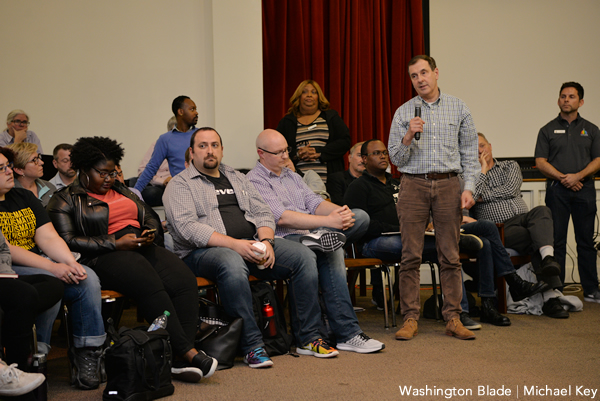
Bernie Delia (Washington Blade photo by Michael Key)
Capital Pride board member and Treasurer Ashley Smith said he would do more research on Wells Fargo to determine if Capital Pride should continue to retain the bank as a corporate sponsor.
“We will let you know what we decide,” he said. “At this point it is too close to 2017 Pride so the reassessment will have to apply to next year.”
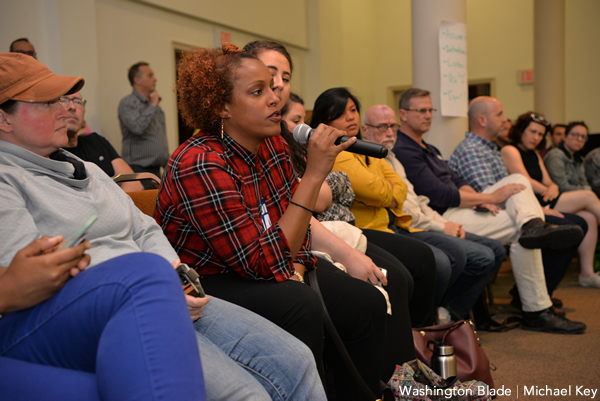
Angela Peoples (Washington Blade photo by Michael Key)
Angela Peoples, executive director of the LGBT direct action group GetEQUAL and a member of the No Justice No Pride coalition, said she and others concerned about the direction of Capital Pride have been raising objections to corporate sponsors and police presence at Pride events for the past several years.
“Who is making these decisions?” she asked. “If Capital Pride is committed to listening to the people, who is making these decisions?”
Peoples was among several speakers at the meeting who called on some of Capital Pride’s board members to step down to allow others who they said reflected the true sentiment of the LGBT community, to take their place immediately.
Organizers of No Justice No Pride have argued that D.C. police have targeted LGBT people of color, especially transgender women forced to engage in sex work, for arrest and harassment. They have called on Capital Pride to ban uniformed police from participating in the Pride parade and festival, including members of the police LGBT Liaison Unit.
Delia and other Capital Pride officials have said they understand the concerns about past police-related problems but they believe D.C. police overall have changed and anti-LGBT harassment is far less common.
“It is unacceptable that trans women or men are treated badly by the police,” said Wall. “But we must work together rather than push the police away.”
Delia said last week that Capital Pride would not change its longstanding policy of allowing police and corporate sponsors to be a part of the Pride events. Although he didn’t repeat those comments at Monday night’s meeting he said nothing to indicate Capital Pride had changed its position on those two issues.
During its regularly scheduled meeting on Monday night, the Gertrude Stein Democratic Club, meanwhile, passed a resolution opposing No Justice No Pride’s call for banning D.C. police and corporations from participating in Capital Pride events.
Acting D.C. Police Lt. Brett Parson, who oversees the police liaison units, and Sgt. Jessica Hawkins, supervisor of the LGBT Liaison Unit, attended Monday’s Capital Pride meeting in civilian clothes but wore their badges and police name tags.
“While we weren’t in our formal uniforms we clearly identified as police officers because we wanted to make sure the people didn’t think we were hiding or trying to infiltrate the group but that we were visible as openly gay and openly transgender police officers,” Parson told the Blade.
“But we didn’t say anything because we were here to listen to what this community has to say,” he said. “And the message I hear is they still want to be heard and I stand ready and Jessica stands ready and this police department stands ready to listen and make changes where we can so that people feel safe because that’s what we’re about.”
Parson, who is gay, and Hawkins, a transgender woman, routinely attend LGBT events.
Ruby Corado, founder and executive director of the LGBT community services center Casa Ruby, told the gathering she has good relations with many of the Capital Pride board members and said the board should pay attention to the issues raised by those expressing concern.
“The issues that are on the table are real,” she said. “If you are not a person of color or trans you don’t feel these issues,” she said, adding, “you should acknowledge that you don’t have equality on this board.”
Among other things, Corado proposed that marginalized members of the LGBT community, including trans women of color, be the ones selected to lead the Capital Pride parade on June 10.
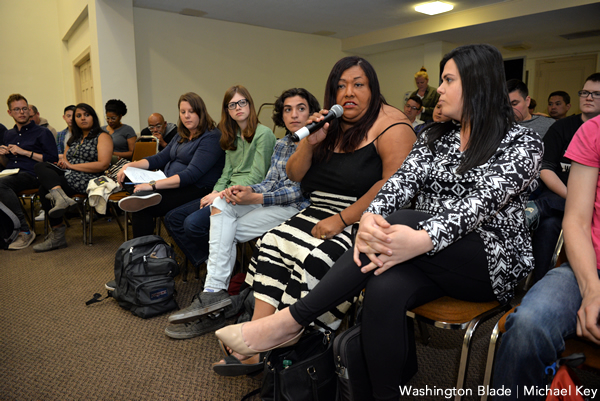
Ruby Corado (Washington Blade photo by Michael Key)
Transgender activist Savanna Wanzer, a member of the Capital Pride board and the lead organizer of D.C.’s annual Capital Trans Pride, and Jose Gutierez, founder and organizer of D.C.’s Latino Pride, praised Capital Pride for playing an important role in supporting those two events.
Gutierez said he was asking Capital Pride to provide additional financial support for Latino Pride.
Wanzer said that as a transgender woman of color she was troubled that some of the speakers criticizing Capital Pride were not recognizing that transgender people and people of color were working hard to build a more equitable and inclusive Pride.
Sue Doster, co-president of Inter Pride, a New York-based group that represents LGBT Pride organizations in the U.S. and abroad, appeared to capture the sentiment of Capital Pride officials in her remarks at the meeting.
“There is a realization that not all people feel the Prides are representing all LGBT people,” she said. “I see real, honest self-reflection on the part of Capital Pride, New York Pride and L.A. Pride,” she continued. “We hear you having this debate, and you have started the process of change.”
Members of No Justice No Pride, however, said the change by Capital Pride wasn’t coming soon enough.
“We are planning a series of events as an alternative to Pride for those who are not interested in participating in the official Capital Pride festivities,” No Justice No Pride spokesperson Drew Ambrogi told the Blade after the meeting.
“We appreciated the opportunity to hear about and discuss many issues related to Pride 2017 activities with a large and diverse group of LGBTQ community members,” Delia told the Blade in a statement Tuesday morning. “This is a year when our visibility and actions are more important than ever. With that in mind, we have decided to take several actions:
- “The first contingent in the Capital Pride Parade will represent a diverse cross section of our community who are most marginalized and under threat, including queer and trans youth, trans people, especially trans women of color and undocumented LGBTQ people.
- “Capital Pride will assist in hosting two Russian LGBT activists to “spotlight the urgent and deplorable anti-gay actions” by the government of Chechnya.
- “Increased ‘support and resources’ will be allocated for Latino Pride.
- “It will explore working with trans youth groups and leaders to help in organizing more youth events with partners.
- “Working groups will be formed to ‘explore and create policies to increase transparency, access and community involvement in the Board by the broader LGBTQ community, including sponsorship and diverse representation throughout the organization.’
- “Capital Pride ‘commits to making public a thorough response to the many questions and issues raised at the forum as soon as possible but not before this year’s Pride activities, which begin this weekend and continue through June.’”
Peoples said on Tuesday morning that she is aware of plans for an alternative Pride event during the Pride weekend of June 10-ll but she was not involved with those plans.
“I think the vast majority of the people at the meeting last night were not happy with what they saw,” she said, adding that Capital Pride’s leadership showed no commitment to make structural changes such as replacing current board members with others from the community.
“That’s another indication to me that they’re interested in only tinkering around the edges and not actually responding to the real concerns of the community,” she said.
‘Alternative’ Pride event announced
No Justice No Pride announced on its Facebook page on Tuesday that it plans to hold an alternative “Queer + Trans Festival” on Saturday, June 10, from 1-7 p.m. at McPherson Square in downtown D.C. The event would partially overlap with the Capital Pride Parade, which kicks off at 4:30 p.m. at 23rd and P Streets, N.W. and usually lasts until 8 p.m.
“This festival will provide food, entertainment, as well as opportunities to connect with local LGBTQ+ groups,” the announcement says. “We’re coming together to celebrate our identities, our communities, and our shared history of resistance – we hope to see you there!”
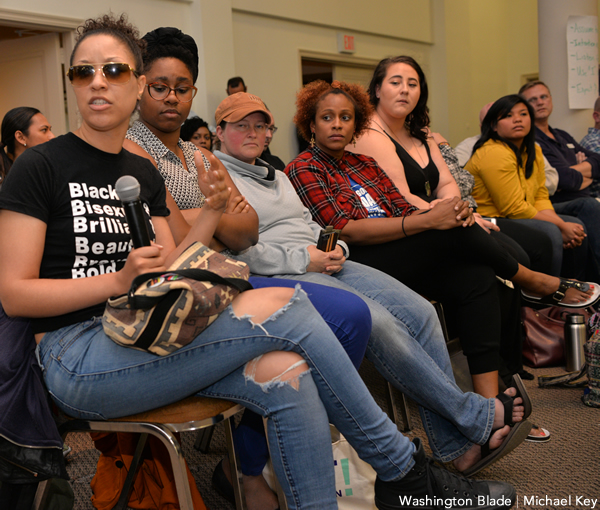
(Washington Blade photo by Michael Key)
homepage news
Honoring the legacy of New Orleans’ 1973 UpStairs Lounge fire
Why the arson attack that killed 32 gay men still resonates 50 years later

On June 23 of last year, I held the microphone as a gay man in the New Orleans City Council Chamber and related a lost piece of queer history to the seven council members. I told this story to disabuse all New Orleanians of the notion that silence and accommodation, in the face of institutional and official failures, are a path to healing.
The story I related to them began on a typical Sunday night at a second-story bar on the fringe of New Orleans’ French Quarter in 1973, where working-class men would gather around a white baby grand piano and belt out the lyrics to a song that was the anthem of their hidden community, “United We Stand” by the Brotherhood of Man.
“United we stand,” the men would sing together, “divided we fall” — the words epitomizing the ethos of their beloved UpStairs Lounge bar, an egalitarian free space that served as a forerunner to today’s queer safe havens.
Around that piano in the 1970s Deep South, gays and lesbians, white and Black queens, Christians and non-Christians, and even early gender minorities could cast aside the racism, sexism, and homophobia of the times to find acceptance and companionship for a moment.
For regulars, the UpStairs Lounge was a miracle, a small pocket of acceptance in a broader world where their very identities were illegal.
On the Sunday night of June 24, 1973, their voices were silenced in a murderous act of arson that claimed 32 lives and still stands as the deadliest fire in New Orleans history — and the worst mass killing of gays in 20th century America.
As 13 fire companies struggled to douse the inferno, police refused to question the chief suspect, even though gay witnesses identified and brought the soot-covered man to officers idly standing by. This suspect, an internally conflicted gay-for-pay sex worker named Rodger Dale Nunez, had been ejected from the UpStairs Lounge screaming the word “burn” minutes before, but New Orleans police rebuffed the testimony of fire survivors on the street and allowed Nunez to disappear.
As the fire raged, police denigrated the deceased to reporters on the street: “Some thieves hung out there, and you know this was a queer bar.”
For days afterward, the carnage met with official silence. With no local gay political leaders willing to step forward, national Gay Liberation-era figures like Rev. Troy Perry of the Metropolitan Community Church flew in to “help our bereaved brothers and sisters” — and shatter officialdom’s code of silence.
Perry broke local taboos by holding a press conference as an openly gay man. “It’s high time that you people, in New Orleans, Louisiana, got the message and joined the rest of the Union,” Perry said.
Two days later, on June 26, 1973, as families hesitated to step forward to identify their kin in the morgue, UpStairs Lounge owner Phil Esteve stood in his badly charred bar, the air still foul with death. He rebuffed attempts by Perry to turn the fire into a call for visibility and progress for homosexuals.
“This fire had very little to do with the gay movement or with anything gay,” Esteve told a reporter from The Philadelphia Inquirer. “I do not want my bar or this tragedy to be used to further any of their causes.”
Conspicuously, no photos of Esteve appeared in coverage of the UpStairs Lounge fire or its aftermath — and the bar owner also remained silent as he witnessed police looting the ashes of his business.
“Phil said the cash register, juke box, cigarette machine and some wallets had money removed,” recounted Esteve’s friend Bob McAnear, a former U.S. Customs officer. “Phil wouldn’t report it because, if he did, police would never allow him to operate a bar in New Orleans again.”
The next day, gay bar owners, incensed at declining gay bar traffic amid an atmosphere of anxiety, confronted Perry at a clandestine meeting. “How dare you hold your damn news conferences!” one business owner shouted.
Ignoring calls for gay self-censorship, Perry held a 250-person memorial for the fire victims the following Sunday, July 1, culminating in mourners defiantly marching out the front door of a French Quarter church into waiting news cameras. “Reverend Troy Perry awoke several sleeping giants, me being one of them,” recalled Charlene Schneider, a lesbian activist who walked out of that front door with Perry.

Esteve doubted the UpStairs Lounge story’s capacity to rouse gay political fervor. As the coroner buried four of his former patrons anonymously on the edge of town, Esteve quietly collected at least $25,000 in fire insurance proceeds. Less than a year later, he used the money to open another gay bar called the Post Office, where patrons of the UpStairs Lounge — some with visible burn scars — gathered but were discouraged from singing “United We Stand.”
New Orleans cops neglected to question the chief arson suspect and closed the investigation without answers in late August 1973. Gay elites in the city’s power structure began gaslighting the mourners who marched with Perry into the news cameras, casting suspicion on their memories and re-characterizing their moment of liberation as a stunt.
When a local gay journalist asked in April 1977, “Where are the gay activists in New Orleans?,” Esteve responded that there were none, because none were needed. “We don’t feel we’re discriminated against,” Esteve said. “New Orleans gays are different from gays anywhere else… Perhaps there is some correlation between the amount of gay activism in other cities and the degree of police harassment.”

An attitude of nihilism and disavowal descended upon the memory of the UpStairs Lounge victims, goaded by Esteve and fellow gay entrepreneurs who earned their keep via gay patrons drowning their sorrows each night instead of protesting the injustices that kept them drinking.
Into the 1980s, the story of the UpStairs Lounge all but vanished from conversation — with the exception of a few sanctuaries for gay political debate such as the local lesbian bar Charlene’s, run by the activist Charlene Schneider.
By 1988, the 15th anniversary of the fire, the UpStairs Lounge narrative comprised little more than a call for better fire codes and indoor sprinklers. UpStairs Lounge survivor Stewart Butler summed it up: “A tragedy that, as far as I know, no good came of.”
Finally, in 1991, at Stewart Butler and Charlene Schneider’s nudging, the UpStairs Lounge story became aligned with the crusade of liberated gays and lesbians seeking equal rights in Louisiana. The halls of power responded with intermittent progress. The New Orleans City Council, horrified by the story but not yet ready to take its look in the mirror, enacted an anti-discrimination ordinance protecting gays and lesbians in housing, employment, and public accommodations that Dec. 12 — more than 18 years after the fire.
“I believe the fire was the catalyst for the anger to bring us all to the table,” Schneider told The Times-Picayune, a tacit rebuke to Esteve’s strategy of silent accommodation. Even Esteve seemed to change his stance with time, granting a full interview with the first UpStairs Lounge scholar Johnny Townsend sometime around 1989.
Most of the figures in this historic tale are now deceased. What’s left is an enduring story that refused to go gently. The story now echoes around the world — a musical about the UpStairs Lounge fire recently played in Tokyo, translating the gay underworld of the 1973 French Quarter for Japanese audiences.
When I finished my presentation to the City Council last June, I looked up to see the seven council members in tears. Unanimously, they approved a resolution acknowledging the historic failures of city leaders in the wake of the UpStairs Lounge fire.
Council members personally apologized to UpStairs Lounge families and survivors seated in the chamber in a symbolic act that, though it could not bring back those who died, still mattered greatly to those whose pain had been denied, leaving them to grieve alone. At long last, official silence and indifference gave way to heartfelt words of healing.
The way Americans remember the past is an active, ongoing process. Our collective memory is malleable, but it matters because it speaks volumes about our maturity as a people, how we acknowledge the past’s influence in our lives, and how it shapes the examples we set for our youth. Do we grapple with difficult truths, or do we duck accountability by defaulting to nostalgia and bluster? Or worse, do we simply ignore the past until it fades into a black hole of ignorance and indifference?
I believe that a factual retelling of the UpStairs Lounge tragedy — and how, 50 years onward, it became known internationally — resonates beyond our current divides. It reminds queer and non-queer Americans that ignoring the past holds back the present, and that silence is no cure for what ails a participatory nation.
Silence isolates. Silence gaslights and shrouds. It preserves the power structures that scapegoat the disempowered.
Solidarity, on the other hand, unites. Solidarity illuminates a path forward together. Above all, solidarity transforms the downtrodden into a resounding chorus of citizens — in the spirit of voices who once gathered ‘round a white baby grand piano and sang, joyfully and loudly, “United We Stand.”

Robert W. Fieseler is a New Orleans-based journalist and the author of “Tinderbox: the Untold Story of the Up Stairs Lounge Fire and the Rise of Gay Liberation.”
homepage news
New Supreme Court term includes critical LGBTQ case with ‘terrifying’ consequences
Business owner seeks to decline services for same-sex weddings

The U.S. Supreme Court, after a decision overturning Roe v. Wade that still leaves many reeling, is starting a new term with justices slated to revisit the issue of LGBTQ rights.
In 303 Creative v. Elenis, the court will return to the issue of whether or not providers of custom-made goods can refuse service to LGBTQ customers on First Amendment grounds. In this case, the business owner is Lorie Smith, a website designer in Colorado who wants to opt out of providing her graphic design services for same-sex weddings despite the civil rights law in her state.
Jennifer Pizer, acting chief legal officer of Lambda Legal, said in an interview with the Blade, “it’s not too much to say an immeasurably huge amount is at stake” for LGBTQ people depending on the outcome of the case.
“This contrived idea that making custom goods, or offering a custom service, somehow tacitly conveys an endorsement of the person — if that were to be accepted, that would be a profound change in the law,” Pizer said. “And the stakes are very high because there are no practical, obvious, principled ways to limit that kind of an exception, and if the law isn’t clear in this regard, then the people who are at risk of experiencing discrimination have no security, no effective protection by having a non-discrimination laws, because at any moment, as one makes their way through the commercial marketplace, you don’t know whether a particular business person is going to refuse to serve you.”
The upcoming arguments and decision in the 303 Creative case mark a return to LGBTQ rights for the Supreme Court, which had no lawsuit to directly address the issue in its previous term, although many argued the Dobbs decision put LGBTQ rights in peril and threatened access to abortion for LGBTQ people.
And yet, the 303 Creative case is similar to other cases the Supreme Court has previously heard on the providers of services seeking the right to deny services based on First Amendment grounds, such as Masterpiece Cakeshop and Fulton v. City of Philadelphia. In both of those cases, however, the court issued narrow rulings on the facts of litigation, declining to issue sweeping rulings either upholding non-discrimination principles or First Amendment exemptions.
Pizer, who signed one of the friend-of-the-court briefs in opposition to 303 Creative, said the case is “similar in the goals” of the Masterpiece Cakeshop litigation on the basis they both seek exemptions to the same non-discrimination law that governs their business, the Colorado Anti-Discrimination Act, or CADA, and seek “to further the social and political argument that they should be free to refuse same-sex couples or LGBTQ people in particular.”
“So there’s the legal goal, and it connects to the social and political goals and in that sense, it’s the same as Masterpiece,” Pizer said. “And so there are multiple problems with it again, as a legal matter, but also as a social matter, because as with the religion argument, it flows from the idea that having something to do with us is endorsing us.”
One difference: the Masterpiece Cakeshop litigation stemmed from an act of refusal of service after owner, Jack Phillips, declined to make a custom-made wedding cake for a same-sex couple for their upcoming wedding. No act of discrimination in the past, however, is present in the 303 Creative case. The owner seeks to put on her website a disclaimer she won’t provide services for same-sex weddings, signaling an intent to discriminate against same-sex couples rather than having done so.
As such, expect issues of standing — whether or not either party is personally aggrieved and able bring to a lawsuit — to be hashed out in arguments as well as whether the litigation is ripe for review as justices consider the case. It’s not hard to see U.S. Chief Justice John Roberts, who has sought to lead the court to reach less sweeping decisions (sometimes successfully, and sometimes in the Dobbs case not successfully) to push for a decision along these lines.
Another key difference: The 303 Creative case hinges on the argument of freedom of speech as opposed to the two-fold argument of freedom of speech and freedom of religious exercise in the Masterpiece Cakeshop litigation. Although 303 Creative requested in its petition to the Supreme Court review of both issues of speech and religion, justices elected only to take up the issue of free speech in granting a writ of certiorari (or agreement to take up a case). Justices also declined to accept another question in the petition request of review of the 1990 precedent in Smith v. Employment Division, which concluded states can enforce neutral generally applicable laws on citizens with religious objections without violating the First Amendment.
Representing 303 Creative in the lawsuit is Alliance Defending Freedom, a law firm that has sought to undermine civil rights laws for LGBTQ people with litigation seeking exemptions based on the First Amendment, such as the Masterpiece Cakeshop case.
Kristen Waggoner, president of Alliance Defending Freedom, wrote in a Sept. 12 legal brief signed by her and other attorneys that a decision in favor of 303 Creative boils down to a clear-cut violation of the First Amendment.
“Colorado and the United States still contend that CADA only regulates sales transactions,” the brief says. “But their cases do not apply because they involve non-expressive activities: selling BBQ, firing employees, restricting school attendance, limiting club memberships, and providing room access. Colorado’s own cases agree that the government may not use public-accommodation laws to affect a commercial actor’s speech.”
Pizer, however, pushed back strongly on the idea a decision in favor of 303 Creative would be as focused as Alliance Defending Freedom purports it would be, arguing it could open the door to widespread discrimination against LGBTQ people.
“One way to put it is art tends to be in the eye of the beholder,” Pizer said. “Is something of a craft, or is it art? I feel like I’m channeling Lily Tomlin. Remember ‘soup and art’? We have had an understanding that whether something is beautiful or not is not the determining factor about whether something is protected as artistic expression. There’s a legal test that recognizes if this is speech, whose speech is it, whose message is it? Would anyone who was hearing the speech or seeing the message understand it to be the message of the customer or of the merchants or craftsmen or business person?”
Despite the implications in the case for LGBTQ rights, 303 Creative may have supporters among LGBTQ people who consider themselves proponents of free speech.
One joint friend-of-the-court brief before the Supreme Court, written by Dale Carpenter, a law professor at Southern Methodist University who’s written in favor of LGBTQ rights, and Eugene Volokh, a First Amendment legal scholar at the University of California, Los Angeles, argues the case is an opportunity to affirm the First Amendment applies to goods and services that are uniquely expressive.
“Distinguishing expressive from non-expressive products in some contexts might be hard, but the Tenth Circuit agreed that Smith’s product does not present a hard case,” the brief says. “Yet that court (and Colorado) declined to recognize any exemption for products constituting speech. The Tenth Circuit has effectively recognized a state interest in subjecting the creation of speech itself to antidiscrimination laws.”
Oral arguments in the case aren’t yet set, but may be announced soon. Set to defend the state of Colorado and enforcement of its non-discrimination law in the case is Colorado Solicitor General Eric Reuel Olson. Just this week, the U.S. Supreme Court announced it would grant the request to the U.S. solicitor general to present arguments before the justices on behalf of the Biden administration.
With a 6-3 conservative majority on the court that has recently scrapped the super-precedent guaranteeing the right to abortion, supporters of LGBTQ rights may think the outcome of the case is all but lost, especially amid widespread fears same-sex marriage would be next on the chopping block. After the U.S. Tenth Circuit Court of Appeals ruled against 303 Creative in the lawsuit, the simple action by the Supreme Court to grant review in the lawsuit suggests they are primed to issue a reversal and rule in favor of the company.
Pizer, acknowledging the call to action issued by LGBTQ groups in the aftermath of the Dobbs decision, conceded the current Supreme Court issuing the ruling in this case is “a terrifying prospect,” but cautioned the issue isn’t so much the makeup of the court but whether or not justices will continue down the path of abolishing case law.
“I think the question that we’re facing with respect to all of the cases or at least many of the cases that are in front of the court right now, is whether this court is going to continue on this radical sort of wrecking ball to the edifice of settled law and seemingly a goal of setting up whole new structures of what our basic legal principles are going to be. Are we going to have another term of that?” Pizer said. “And if so, that’s terrifying.”
homepage news
Kelley Robinson, a Black, queer woman, named president of Human Rights Campaign
Progressive activist a veteran of Planned Parenthood Action Fund

Kelley Robinson, a Black, queer woman and veteran of Planned Parenthood Action Fund, is to become the next president of the Human Rights Campaign, the nation’s leading LGBTQ group announced on Tuesday.
Robinson is set to become the ninth president of the Human Rights Campaign after having served as executive director of Planned Parenthood Action Fund and more than 12 years of experience as a leader in the progressive movement. She’ll be the first Black, queer woman to serve in that role.
“I’m honored and ready to lead HRC — and our more than three million member-advocates — as we continue working to achieve equality and liberation for all Lesbian, Gay, Bisexual, Transgender, and Queer people,” Robinson said. “This is a pivotal moment in our movement for equality for LGBTQ+ people. We, particularly our trans and BIPOC communities, are quite literally in the fight for our lives and facing unprecedented threats that seek to destroy us.”
The next Human Rights Campaign president is named as Democrats are performing well in polls in the mid-term elections after the U.S. Supreme Court overturned Roe v. Wade, leaving an opening for the LGBTQ group to play a key role amid fears LGBTQ rights are next on the chopping block.
“The overturning of Roe v. Wade reminds us we are just one Supreme Court decision away from losing fundamental freedoms including the freedom to marry, voting rights, and privacy,” Robinson said. “We are facing a generational opportunity to rise to these challenges and create real, sustainable change. I believe that working together this change is possible right now. This next chapter of the Human Rights Campaign is about getting to freedom and liberation without any exceptions — and today I am making a promise and commitment to carry this work forward.”
The Human Rights Campaign announces its next president after a nearly year-long search process after the board of directors terminated its former president Alphonso David when he was ensnared in the sexual misconduct scandal that led former New York Gov. Andrew Cuomo to resign. David has denied wrongdoing and filed a lawsuit against the LGBTQ group alleging racial discrimination.

-

 State Department3 days ago
State Department3 days agoState Department releases annual human rights report
-

 South America1 day ago
South America1 day agoArgentina government dismisses transgender public sector employees
-

 Maryland5 days ago
Maryland5 days agoJoe Vogel campaign holds ‘Big Gay Canvass Kickoff’
-

 District of Columbia1 day ago
District of Columbia1 day agoCatching up with the asexuals and aromantics of D.C.



